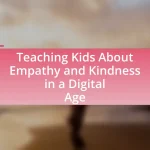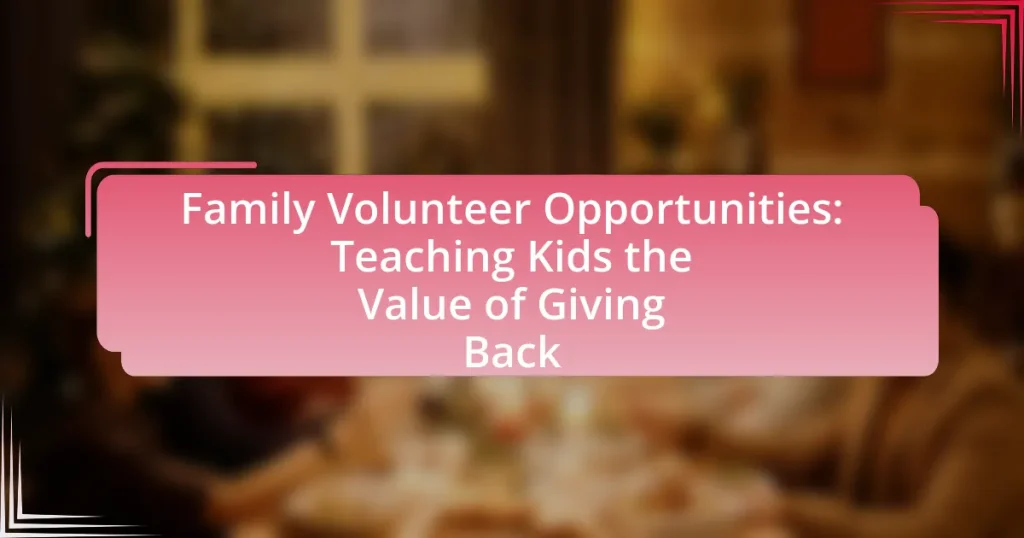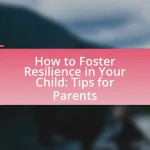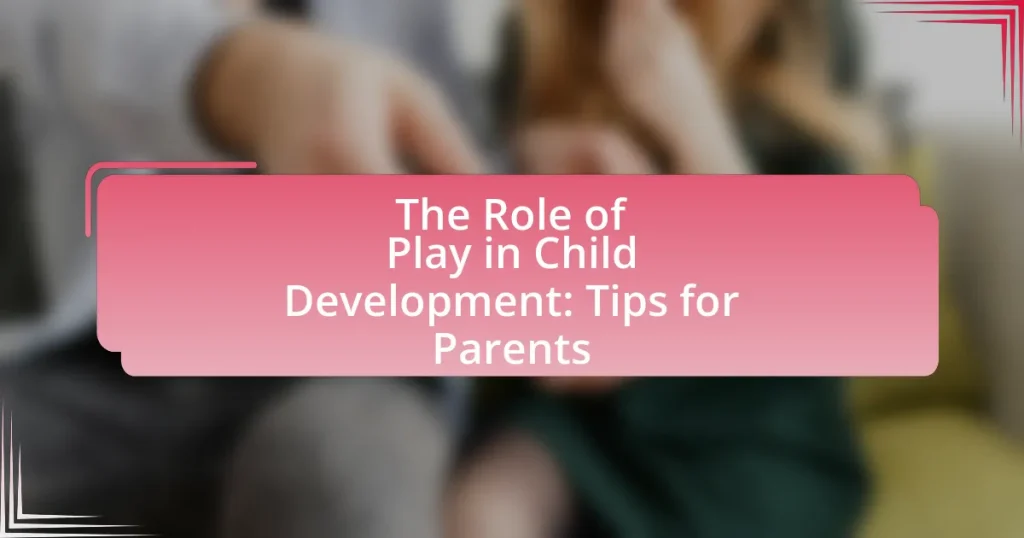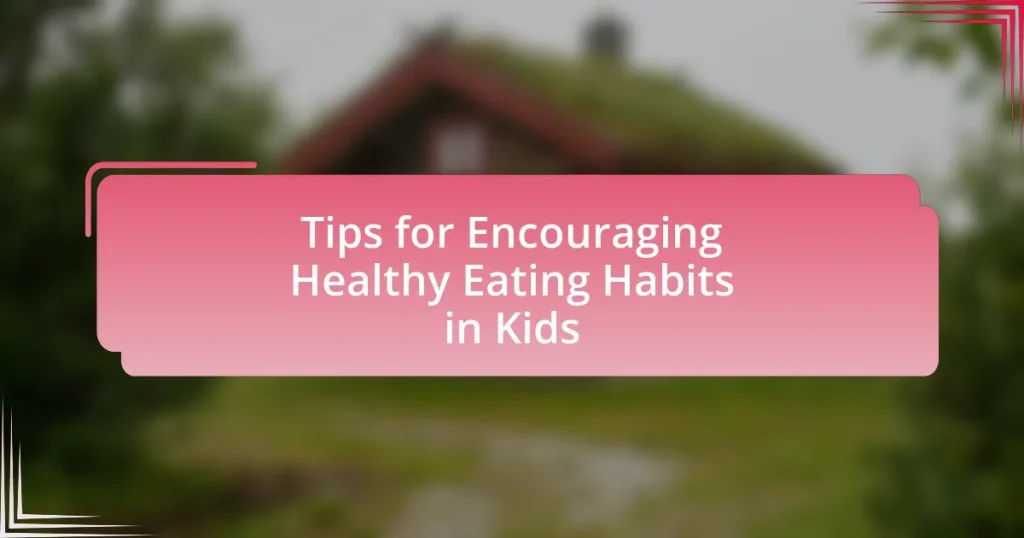Family volunteer opportunities are activities that families can engage in together to support their communities and foster social responsibility. These activities include serving at food banks, participating in community clean-ups, and volunteering at local shelters, which not only benefit the community but also teach children valuable lessons in empathy and teamwork. The article outlines how families can find and participate in these opportunities, the types of activities suitable for different age groups, and the long-term benefits of volunteering for both children and families. It emphasizes the importance of shared experiences in strengthening family bonds and instilling a commitment to civic engagement in children.
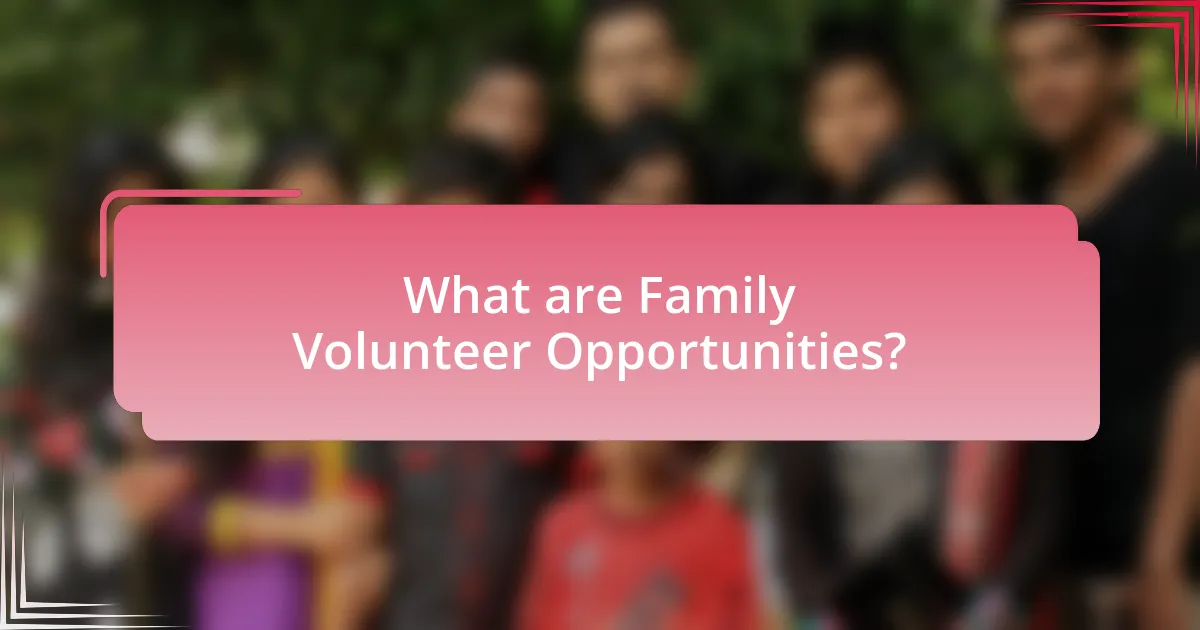
What are Family Volunteer Opportunities?
Family volunteer opportunities are activities that families can participate in together to support their communities and help those in need. These opportunities often include serving at food banks, participating in community clean-up events, or volunteering at local shelters. Engaging in such activities not only benefits the community but also teaches children the importance of empathy and social responsibility, fostering a sense of teamwork and shared values within the family.
How can families get involved in volunteering together?
Families can get involved in volunteering together by participating in community service projects, such as food drives, park clean-ups, or local charity events. Engaging in these activities fosters teamwork and teaches children the importance of giving back. Research indicates that families who volunteer together strengthen their bonds and instill values of empathy and social responsibility in children, as highlighted in studies by the Corporation for National and Community Service, which found that children who volunteer are more likely to continue volunteering as adults.
What types of activities are suitable for families?
Family volunteer opportunities that are suitable for families include community clean-up events, food bank assistance, and participating in charity runs. These activities allow families to work together towards a common goal, fostering teamwork and a sense of community. For instance, community clean-up events not only improve local environments but also teach children the importance of environmental stewardship. Engaging in food bank assistance helps families understand food insecurity and the value of helping those in need. Charity runs often promote health and fitness while raising funds for various causes, reinforcing the idea of giving back to the community.
How can families find local volunteer opportunities?
Families can find local volunteer opportunities by utilizing online platforms such as VolunteerMatch, Idealist, and local community service websites. These platforms aggregate various volunteer opportunities based on location, allowing families to filter options that suit their interests and availability. Additionally, local nonprofits, schools, and community centers often post volunteer needs on bulletin boards or their websites, providing direct access to opportunities in the area. Research indicates that engaging in volunteer work can enhance family bonding and instill values of empathy and social responsibility in children, making these opportunities beneficial for family development.
Why is volunteering important for families?
Volunteering is important for families because it fosters a sense of community, teaches valuable life skills, and strengthens family bonds. Engaging in volunteer activities allows families to work together towards a common goal, enhancing teamwork and communication. Research indicates that children who volunteer with their families are more likely to develop empathy and social responsibility, as they learn the importance of giving back to their communities. According to a study published in the Journal of Family Psychology, families that volunteer together report higher levels of satisfaction and connection, demonstrating the positive impact of shared experiences in service.
What values do children learn from volunteering?
Children learn empathy, responsibility, teamwork, and gratitude from volunteering. Engaging in volunteer activities allows children to understand the feelings of others, fostering empathy as they witness different life situations. Responsibility is cultivated as they commit to tasks and see the impact of their contributions. Teamwork is developed through collaboration with peers and adults, enhancing their social skills. Gratitude emerges as children recognize the value of their own circumstances in comparison to those they help. Research indicates that children who volunteer are more likely to develop a strong sense of civic responsibility and community engagement later in life.
How does volunteering strengthen family bonds?
Volunteering strengthens family bonds by fostering shared experiences and teamwork among family members. Engaging in volunteer activities together allows families to collaborate towards a common goal, enhancing communication and mutual understanding. Research indicates that families who volunteer together report higher levels of satisfaction and connection, as they create lasting memories and develop a sense of purpose. For instance, a study published in the Journal of Family Psychology found that families participating in community service activities experienced improved relationships and increased feelings of closeness.
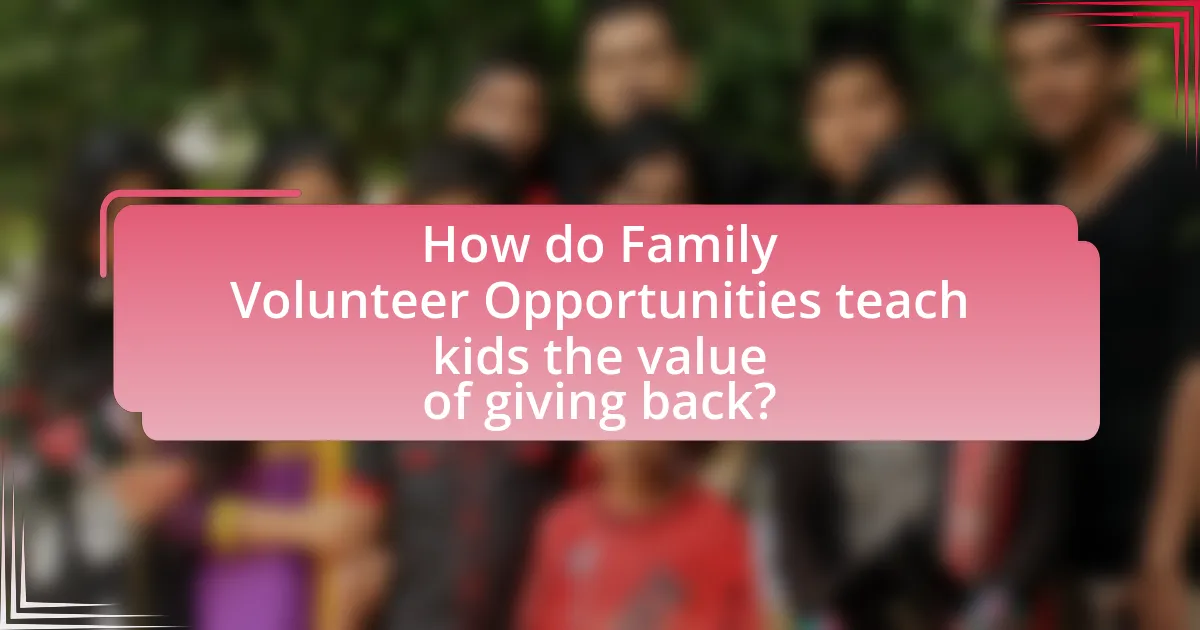
How do Family Volunteer Opportunities teach kids the value of giving back?
Family volunteer opportunities teach kids the value of giving back by actively engaging them in community service, which fosters empathy and social responsibility. When children participate in volunteer activities alongside their families, they witness firsthand the positive impact of their contributions, reinforcing the idea that helping others is essential. Research indicates that children who engage in volunteer work are more likely to develop a lifelong commitment to civic engagement and altruism, as evidenced by a study published in the Journal of Adolescence, which found that youth involved in community service are more likely to exhibit prosocial behaviors later in life.
What skills do children develop through volunteering?
Children develop various skills through volunteering, including teamwork, communication, empathy, and problem-solving. Engaging in volunteer activities requires children to collaborate with others, enhancing their ability to work as part of a team. Effective communication is fostered as they interact with peers and community members, learning to express their thoughts and listen to others. Volunteering also cultivates empathy, as children gain insights into the challenges faced by different individuals and communities, promoting a sense of social responsibility. Additionally, they encounter real-world problems that require creative solutions, thereby improving their problem-solving skills. Research indicates that children who volunteer are more likely to develop a strong sense of civic engagement and personal responsibility, further validating the importance of these skills in their overall development.
How does volunteering enhance empathy in children?
Volunteering enhances empathy in children by exposing them to diverse perspectives and experiences, fostering a deeper understanding of others’ feelings and situations. Engaging in volunteer activities allows children to interact with individuals from various backgrounds, which helps them recognize and appreciate the challenges faced by others. Research indicates that children who participate in community service develop stronger emotional intelligence and are more likely to exhibit prosocial behaviors, such as kindness and compassion. A study published in the Journal of Youth and Adolescence found that youth involved in volunteer work reported increased empathy levels, demonstrating the positive impact of such experiences on their emotional development.
What role does teamwork play in family volunteering?
Teamwork is essential in family volunteering as it fosters collaboration and strengthens family bonds. When families work together on volunteer projects, they learn to communicate effectively, share responsibilities, and support one another, which enhances their collective problem-solving skills. Research indicates that engaging in teamwork during volunteer activities not only improves the quality of the service provided but also instills a sense of shared purpose and accomplishment among family members, reinforcing the values of empathy and cooperation.
Why should families prioritize volunteering in their routines?
Families should prioritize volunteering in their routines because it fosters a sense of community and teaches children the importance of empathy and social responsibility. Engaging in volunteer activities allows families to bond while contributing positively to society, which can enhance their collective well-being. Research indicates that children who participate in volunteer work are more likely to develop strong moral values and a commitment to helping others, as evidenced by a study published in the Journal of Family Psychology, which found that family volunteering significantly increases children’s prosocial behavior.
How can regular volunteering impact a child’s perspective on community?
Regular volunteering can significantly enhance a child’s perspective on community by fostering a sense of belonging and responsibility. Engaging in volunteer activities exposes children to diverse social issues and the needs of others, which cultivates empathy and awareness. Research indicates that children who participate in community service are more likely to develop a positive attitude towards civic engagement and social responsibility, as evidenced by a study published in the Journal of Community Psychology, which found that youth volunteers reported higher levels of community attachment and civic participation. This involvement not only helps children understand the importance of contributing to their community but also encourages them to take active roles in addressing local challenges.
What long-term benefits can arise from early volunteer experiences?
Early volunteer experiences can lead to significant long-term benefits, including enhanced social skills, increased empathy, and improved academic performance. Engaging in volunteer work at a young age fosters teamwork and communication abilities, as children learn to collaborate with diverse groups. Research indicates that children who volunteer are more likely to develop a strong sense of empathy, which can positively influence their relationships and community involvement throughout life. Additionally, studies show that students who participate in volunteer activities often achieve higher grades and have better attendance records, as the skills gained from volunteering translate into improved focus and responsibility in academic settings.
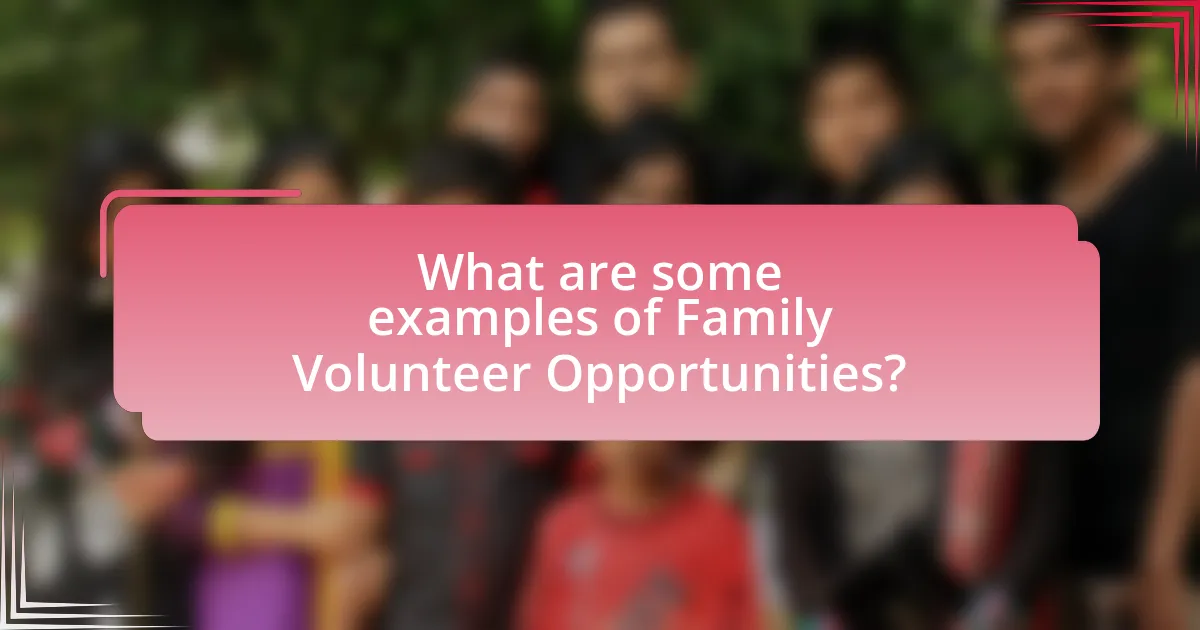
What are some examples of Family Volunteer Opportunities?
Family volunteer opportunities include activities such as participating in community clean-up events, serving meals at local shelters, and organizing food drives. These activities allow families to work together while contributing positively to their communities. For instance, according to the Corporation for National and Community Service, families that volunteer together strengthen their bonds and instill values of empathy and responsibility in children.
What types of organizations often seek family volunteers?
Organizations that often seek family volunteers include non-profit organizations, community service groups, schools, religious institutions, and environmental organizations. Non-profit organizations frequently rely on family volunteers to assist with events, fundraising, and outreach programs, as they often have limited resources. Community service groups engage families in local initiatives, promoting civic responsibility and teamwork. Schools may involve families in educational programs and extracurricular activities, fostering a sense of community. Religious institutions often encourage family volunteering through service projects and charitable events, reinforcing values of compassion and giving. Environmental organizations seek family volunteers for conservation efforts, clean-up events, and educational programs, emphasizing the importance of stewardship for future generations.
How can families volunteer at local shelters or food banks?
Families can volunteer at local shelters or food banks by contacting these organizations directly to inquire about available opportunities. Many shelters and food banks offer family-friendly volunteer options, such as sorting food, preparing meals, or organizing donation drives. For instance, the Feeding America network, which includes over 200 food banks across the United States, encourages family participation in various activities, making it easier for families to engage in community service together.
What community events can families participate in together?
Families can participate in community events such as local clean-up days, food drives, and charity walks. These events foster teamwork and instill values of service and responsibility in children. For instance, participating in a local clean-up day not only helps beautify the neighborhood but also teaches children the importance of environmental stewardship. Additionally, food drives often involve sorting and packaging food items, which can educate children about hunger issues in their community. Charity walks typically raise funds for various causes, allowing families to contribute to meaningful initiatives while promoting physical activity and community engagement.
How can families create their own volunteer projects?
Families can create their own volunteer projects by identifying a community need and organizing activities that address it. For example, families can assess local issues such as food insecurity or environmental concerns and then plan initiatives like food drives or neighborhood clean-ups. Research indicates that engaging in community service fosters empathy and social responsibility in children, reinforcing the value of giving back. By actively participating in these projects, families not only contribute to their community but also teach their children the importance of civic engagement.
What steps should families take to plan a successful volunteer event?
Families should take the following steps to plan a successful volunteer event: first, identify a cause that resonates with all family members, ensuring it aligns with their values and interests. Next, research local organizations or community needs that require assistance, such as food banks or environmental clean-ups. After selecting a specific organization, families should coordinate with them to understand their requirements, available dates, and any necessary training or materials.
Then, families should set a date and time for the event, ensuring it accommodates everyone’s schedules. Promoting the event within their community can help gather additional volunteers, enhancing the impact of their efforts. Finally, after the event, families should reflect on their experience together, discussing what they learned and how they can continue to contribute to the community, reinforcing the value of giving back.
How can families involve their children in the planning process?
Families can involve their children in the planning process by encouraging them to participate in discussions about volunteer opportunities and decision-making. This can include asking children for their input on which causes they feel passionate about, allowing them to help set goals for the family’s volunteer activities, and assigning them specific roles or tasks in the planning stages. Research shows that children who are actively engaged in planning are more likely to develop a sense of responsibility and commitment to community service, fostering a lifelong value of giving back.
What are some tips for making family volunteering enjoyable?
To make family volunteering enjoyable, choose activities that align with the interests and abilities of all family members. Engaging in tasks that everyone finds meaningful fosters enthusiasm and participation. For example, volunteering at an animal shelter can be exciting for animal lovers, while participating in a community garden can appeal to those who enjoy nature. Additionally, setting achievable goals during the volunteering experience enhances satisfaction and a sense of accomplishment. Research shows that families who volunteer together report stronger bonds and improved communication, highlighting the positive impact of shared experiences on family dynamics.
How can families choose age-appropriate volunteer activities?
Families can choose age-appropriate volunteer activities by assessing the interests and abilities of each family member and matching them with suitable opportunities. For example, younger children may engage in simple tasks like sorting donations or participating in community clean-ups, while older children and teenagers can take on more complex roles such as mentoring younger peers or organizing events. Research indicates that age-appropriate volunteering not only enhances children’s skills but also fosters a sense of responsibility and community engagement, making it essential for families to align activities with developmental stages.
What strategies can families use to keep kids engaged during volunteering?
Families can keep kids engaged during volunteering by involving them in age-appropriate tasks that match their interests and skills. For instance, younger children may enjoy hands-on activities like sorting donations or crafting items for a cause, while older kids can take on responsibilities such as organizing events or leading small groups. Research shows that children are more likely to remain engaged when they feel a sense of ownership and responsibility in their tasks. Additionally, families can set specific goals for their volunteering efforts, such as collecting a certain number of items or completing a project within a timeframe, which can motivate kids to stay focused and committed. Engaging in discussions about the impact of their work can also enhance their understanding and connection to the cause, reinforcing the value of giving back.







